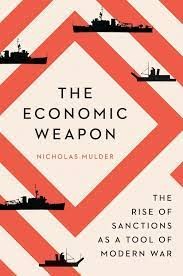Arising out of a PhD project and focusing on the modern form of sanctions, Nicholas Mulder's "The Economic Weapon: The Rise of Sanctions as a Tool of Modern War" (2022) is a fascinating historical journey. I picked up this book because I teach ethics for law and policy, and during the themes of war and peace we cover sanctions. This book provides a wealth of historical insight into the intentions and justifications of sanctions, as well as the outcomes - those that were expected and unexpected. The book has a wealth of interesting contextual stories (see below on coal, for example). A few notes:
"Today, economic sanctions are generally regarded as an alternative to war. But for most people in the interwar period, the economic weapon was the very essence of total war. Many sanctionists regretfully noted the devastating effects of pressure on civilians but nonetheless wholly accepted them. Woodrow Wilson held that if "thoughtful men have . . . thought, and thought truly, that war is barbarous, . . . the boycott is an infinitely more terrible instrument of war." (p. 4)
"While economic pressure is an age-old weapon, economic sanctions to enforce visions of international order are a distinctly modern innovation. This narrower definition of "sanctions" helps to distinguish them from related but distinct tools of policy regarding trade, industry, development, technology, and aid." (p. 14)
"Due to its enormous coal exports, Britain was also the world's premier energy exporter; in the words of one historian, it was "the Saudi Arabia of 1900." Over three-quarters of the eighty million tons of coking coal, the fuel used by 96 percent of the world's cargo vessels, came from the British Isles." (p. 34)
"The fascist invasion of Ethiopia was the first occasion on which the League's economic weapon was put into full operation... League sanctions did not compel Italy to break off its war, nor did they save the government of Emperor Haile Selassie or the independence of the Ethiopians." (p. 202)
"This aim to make the aggressor "pay through the nose" emerged as a distinct model of how sanctions could cut short ambitions for war. It was a theory of attrition rather than a deterrent. The British and French governments expected that in the face of an economic threat, Mussolini would not budge as quickly as Pašić and Pangalos had done in the 1920s. But they were confident that they could wear down Italian endurance while staying clear of actual war. On the basis of this estimation, British foreign secretary Samuel Hoare and French prime minister Pierre Laval agreed at the League Assembly in mid-September to rule out more invasive sanctions, such as an oil embargo, closure of the Suez Canal, or a naval blockade, as unnecessarily provocative." (p. 212-213)
"Many of today's internationalists, too, see few alternatives. This perception has driven some of the most grievously counterproductive uses of sanctions, most prominently against Iraq in the 1990s, when its strangulation at the hands of the UN Security Council cost hundreds of thousands of lives and permanently damaged the country's social and economic fabric. These humanitarian nightmares are an important reminder of the lethal early twentieth-century origins of sanctions." (p. 293)

